Das Olympische Bildungsmagazin
The IOC, the olympic family and the absolutely impeccable reputation of KGB/FSB agents
- Jens Weinreich
- 23. Juli 2016
- 17:35
- 8 Kommentare
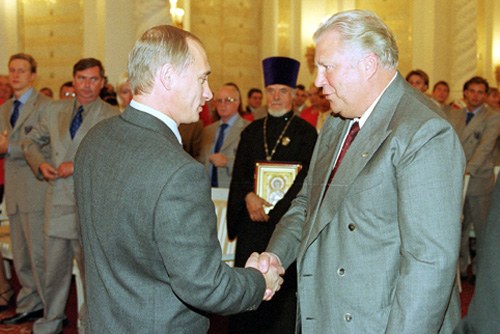
KGB agents: Vladimir Putin and IOC honorary member Vitaly Smirnov – chair of a new „anti-doping commission“ and architect of the Soviet sports empire (Photo: President of Russia)
There are still astonishing deep links at the heart of the Olympic movement, the International Olympic Committee (IOC) and the secret services of the Soviet Union (KGB) and Russia (FSB). Even senior IOC members have told me repeatedly: the answers to many thrilling Olympic questions will be found in the Lubyanka archives. Additionally my Russian friends are telling me: it is all in the KGB files.
Will we ever get to know?
Recently we heard a lot about the major role of the Russian Federal Security Service (FSB) in the state-orchestrated doping scheme. According to Richard McLaren’s stunning report, the FSB agents responsible for the state-sponsored doping conspiracy were called „the magicians“.
The IP investigation has identified a role played by FSB Blokhin and two other unidentified persons from the FSB in the operations of both the Moscow and the Sochi laboratories. The FSB role is not interference and control, like that of the Deputy Minister of Sport, but assistance in arranging and operating the State sponsored system of sample swapping that occurred in connection with: the 2013 University Games and IAAF Championships, the Sochi laboratory and in the lead up to the WADA seizure of samples in December 2014.
There have been more (and there are more) magicians.
Vladimir Putin is the most famous (former) KGB agent in the world and the (former) head of the KGB’s successor, FSB (1998-1999). Mr Putin was rightly described as the most powerful man in the Olympic world over the last decade. This has probably changed but he is still a major factor in the Olympic business. On Friday, Mr Putin announced a „proposal to the Russian Olympic Committee“ …
… on establishing an independent – this is very important – public commission that would include both Russian and foreign experts in medicine and law, as well as respected public and sports activists and experts. The commission’s key task would be to quickly develop a national anti-doping plan that involves strict oversight of its implementation.
As we all know and according to the Olympic Charter, which is absolutely respected in Russia, the Russian Olympic Committee (ROC) is totally independent from politics. The ROC will now have a critical look at Mr Putin’s proposal and will, probably, take up the idea (I would never wish to say ‚the order‘, the ‚ukase‘, the ‚instruction‘, the ‚decree‘).
Mr Putin – Honorary President of International Judo Federation (IJF); Honorary President of the European Judo Union (EJU); Honorary President of the International Federation of Sambo (FIAS), a sport developed in the Red Army and the KGB in the Soviet Union; holder of the black belt in karate; holder of the 8th dan of judo; Master of Sports in judo; honorary doctorate in judo from Yong In university; and Master of Sports in Sambo (among other titles) – made a second, for want of a better word, recommendation:
The question is of course who would be at the head of the commission. Clearly, the answer is a person with an absolutely impeccable reputation, somebody who has credibility and the respect of the Olympic family. We have a person like this in our country. It is Vitaly Smirnov, Russia’s representative in the International Olympic Committee, a member since 1971. I think we should ask him to head up the commission. I hope that he will accept as a person who has devoted so many years to the Olympic movement and the development of sports in our country.
Well now…
A person with an absolutely impeccable reputation, somebody who has credibility and the respect of the Olympic family.
The 81 years old Vitaly Smirnov, IOC member from 1971-2015, is one of the architects of the Soviet sports system. He is now an honorary member of the IOC.
He was First Vice-Minister of Sport of the USSR (1970-1975); Minister of Sport of the Russian Federation (1981-1990) among other senior positions, he served as Executive President of the Organising Committee of the Games of the XXII Olympiad Moscow 1980 (1975- 1981); was USSR National Olympic Committee President (1990-1992); President (1992-2001) then Honorary President (2001-) of the Russian Olympic Committee. Cynics would argue that Mr Smirnov may have inside knowledge about both the Soviet state doping system and Russia’s doping system.
Cynics would also mention that dear Mr Smirnov was involved in strange Olympic bids in the 1990s (St. Petersburg and Sochi in early stages) which were connected to allegations of money laundering and other olympic deals (ask André Guelfi). Mr Smirnov was involved in a costly and dubious failed Olympic Lottery scheme that was the subject of litigation in Russia and Switzerland. Mr Smirnov and members of his family have been involved in several olympic schemes of alleged bribery (Atlanta 1996, Salt Lake City 2002) and dubious businesses in Switzerland connected to the Lausanne-based White Flag Foundation. And that’s just a brief summary. See, for example, the second Pound report (Ad hoc Commission, Salt Lake City investigation) published in March 1999:
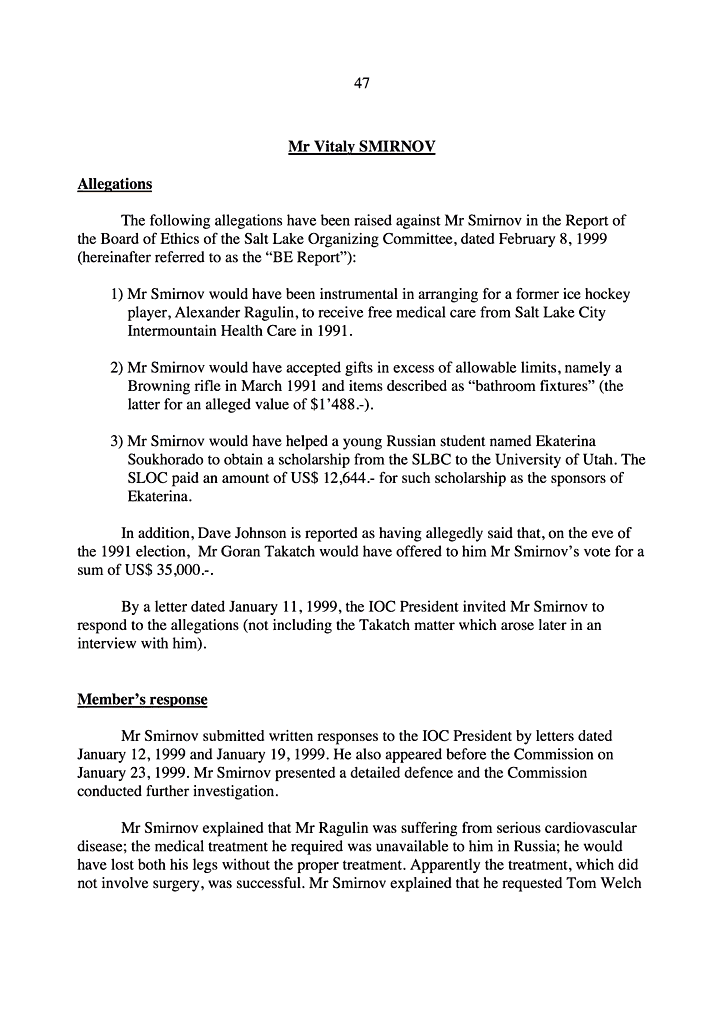
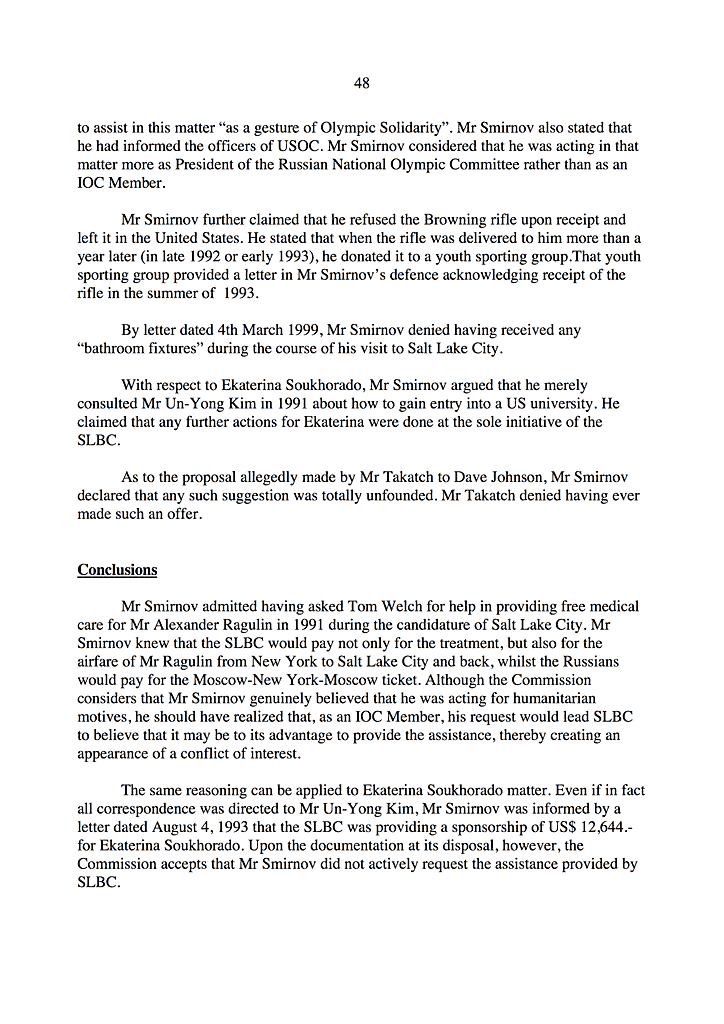
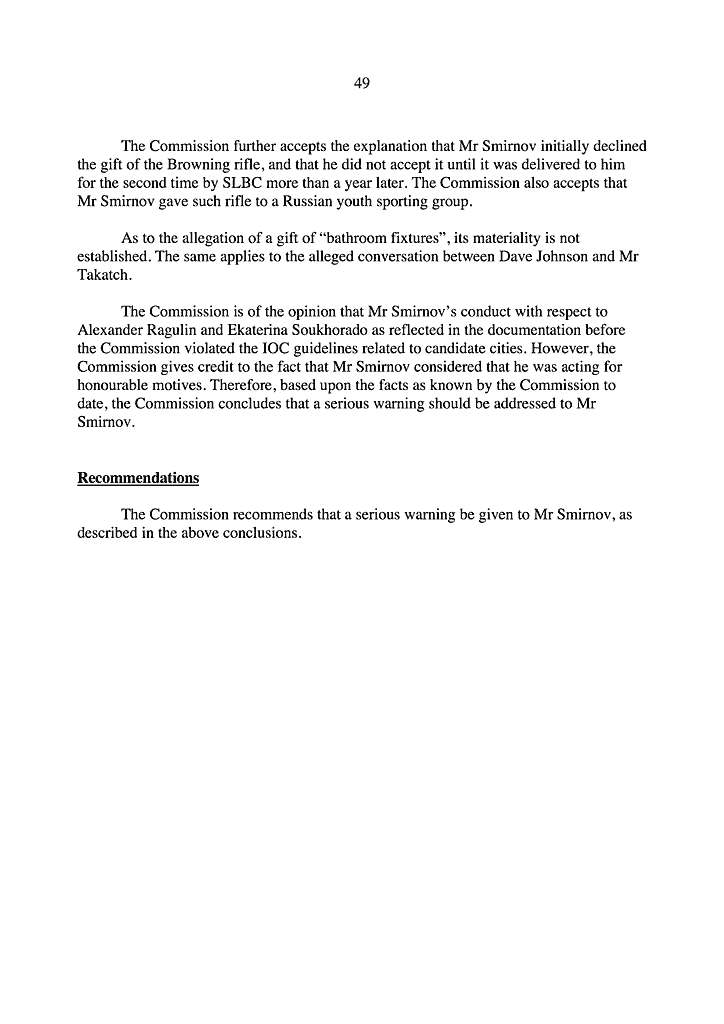
Mr Smirnov, a long time IOC Vice President and IOC Doyen, was given a „serious warning“ by the IOC.
A person with an absolutely impeccable reputation, somebody who has credibility and the respect of the Olympic family.
Let’s have a look at the secret Olympic world.
According to a Russian historian, Mr Smirnov was also a KGB agent. The historian, Yuri Felshtinsky, wrote in his book „The KGB plays Chess“, published in 2009:
Vitaly Smirnov, the Vice President of the International Olympic Committee and head of the NOC of the USSR, was recruited in 1978 by the deputy head of the Fifth Directorate of the KGB, Major General Ivan Abbramov.
That makes sense.
So, what’s going to happen now in Russia, in July 2016 in the heat of the Olympic crisis?
Well, one could conclude: a former KGB agent and head of FSB „suggests“ that another former KGB agent and architect of the Soviet sports system acts as chair of an „independent commission“ with the task to develop a national anti-doping plan.
Got that?
Said Mr Smirnov on Friday according to TASS:
This work requires collective effort, since we all are in the same boat. It is very important to establish good relations, which was emphasized by the IOC, ROC, federations. We will invite authoritative people and we are confident that the commission should include our famed athletes, doctors and all who have any relation to that. We must study the issue thoroughly and then introduce the proposals to the government because it will be impossible to do anything without the state support.
KGB Vitaly promised:
The commission will be working till the final victory.
For the record: I have tried to talk to Mr Smirnov many times in person. At our first meeting in St. Petersburg, 1994, during the Goodwill Games, Vladimir Putin’s first big international task as the Deputy Mayor, Mr Smirnov refused to talk. I tried again and again: I remember my attempts in Budapest (1995), Atlanta (1996), Lausanne (1999), Moscow (2001, 2012, 2013), Salt Lake City (2002), Guatemala (2007), Copenhagen (2009), Vancouver (2010), St. Petersburg (2013), Kuala Lumpur (2015) and on other occasions.
Mr Smirnov always refused to talk to me. He would never answer my questions.
So, here’s a brief summary of the long and thrilling relation between IOC Seniors and KGB Russians. I wrote parts of following piece in 2009 after the publication of „The KGB plays Chess“ – and now I’ve updated the material a touch. Most questions are still unanswered. I have written much more about the topic, in German, see for example my ebook „Macht, Moneten, Marionetten“. Use Google Translate to get an impression:
Did the former IOC President Juan Antonio Samaranch (1920-2010) once work as an agent of the Soviet secret service KGB?
This is one of the most intriguing questions in the Olympic world.
The answer to this question may give some more answers to other important questions:
- How could the Russian resort of Sochi win the Olympic Winter Games 2014?
- How could Russia become the most powerful nation in the Olympic world since 2007?
- What role did the Spaniard Samaranch, IOC President between 1980 and 2001, play in the highly controversial IOC decision for Sochi at the IOC Session in Guatemala alongside famous ex-KGB spy, Vladimir Putin?
- Do members and ex-members of the KGB and its replacement organisation FSB still make Olympic history?
Russian historian Yuri Felshtinsky and former KGB lieutenant colonel Vladimir Popov both claimed in 2008 that Samaranch was hired by the KGB in the late 1970s. Juan Antonio Samaranch, a strong supporter of Spain’s fascist dictator Franco and former secretary for sport, was sent to Moscow in 1977. He served as Spain’s ambassador in the Soviet Union and Mongolia. At this time, Samaranch was IOC Vice-President and head of Olympic protocol.
„Samaranch developed an interest in Russian history and culture. He grew particularly fond of Russian antiques, which he collected with the love of a genuine connoisseur and shipped to his home in Spain. The USSR prohibited taking objects of cultural and historic value out of the country,“ writes Felshtinsky in his book „The Corporation: Russia and the KGB in the Age of President Putin“, which was published in late 2008.
„In Soviet times, all antiques were closely monitored by the KGB; so ambassador Samaranch, a frequent buyer of increasingly valuable rarities, was taken note of. After a while, an agent from the KGB’s Second Main Directorate, which monitored the Spanish embassy, met with Samaranch and gently explained to him that his actions were subject to prosecution in accordance with the RSFRS’s Criminal Code and were classified by Soviet law as the smuggling of contraband goods. Samaranch was offered a choice: he could either be compromised through the publication of articles in the Soviet and foreign press detailing his activities, which would undoubtedly have put an end to his diplomatic career, or he could collaborate with the KGB as a secret agent. Samaranch chose the latter option,“ alleges Felshtinsky.
And, it is claimed, the KGB promised to help Samaranch become IOC President. Documents suggest that Viktor Chebrikov, then KGB deputy head who later became the KGB’s number one, wrote encrypted information to his secret-service comrades in the Eastern Bloc to support Samaranch in any way in order to get the required votes. As a result of the collaboration, „Samaranch was elected President of the IOC“, writes Feshtinsky, „where for many years he loyally served the country to which he was connected by his work as an agent and by his gratitude for its help in getting him a high international position“.
Felshtinsky and Popov repeated the allegations in 2009 in their book „The KGB Plays Chess“. For the first time Vladimir Popov, source of the KGB story in the 2008 book, decided to disclose his identity. In the KGB system, Lieutenant Colonel Popov was responsible for several hundred secret sport agents. Samaranch was only one of them and was called „Soviet Sport General“ within the KGB system.
„Vladimir Popov has lifted his anonymity. This is a new quality“, says Mr. Felshtinsky, who lives in Boston. „Vladimir Popov knows all the names of the sport spies, all the nicknames and all the recruiting officers. He is a very reliable source with strong arguments.“
Mark Adams, Communications Director of the International Olympic Committee (IOC), described the revelations in the book as „sheer speculation“.
Officially, access to KGB files is not allowed in Russia. (That was the status in 2009). In contrast, secret service archives in other former communist countries are open, including the Stasi-archives of the former East Germany. It is an historical matter of fact that the KGB and East Germany’s Stasi had formed a secret service joint venture to spy and undermine the Olympic movement and bring things in the „right direction“.
The infamous sport-political department of Adidas‘ boss Horst Dassler (1936-1987) was the focus of KGB and Stasi attention. Under the leadership of Dassler, a group of several well-known gentlemen played a major role in Olympic business. Dassler’s crew influenced Olympic bids, elections in Olympic IF’s, the allocation of lucrative marketing contracts and almost everything Horst Dassler was interested in. From 1985 to 1987 a young German lawyer, eager to learn and talented in sports politics, worked as Dassler’s loyal assistant: Thomas Bach.
Mr Bach, who became an IOC member in 1991 and was elected as the 9th IOC President in 2013, has always declared that, during his time with Adidas and Horst Dassler, he was never involved in dirty dealings nor did he ever experienced dirty machinations.
Some infamous members of the group: Jean-Marie Weber, Anwar Chowdhry (†), John Boulter (father of Jane Boulter-Davies and father in law of the IAAF official Nick Davies, both suspended), Jean-Claude Schupp, Colonel Hassine Hamouda (†) et al.
Back to the KGB and the descriptions of the authors Felshtinsky and Popov, which coincide with other revelations over the past few years.
The IOC presidential election took place on the eve of the 1980 Olympic Games in Moscow, which were overshadowed by a boycott by most western countries. The IOC election itself was always plagued by rumours and allegations of corruption. Dubious persons like the former French secret service agent and long-time Samaranch-ally André Guelfi, who later played a key role in the huge corruption scandal of the oil giant Elf Aquitaine, have claimed having influenced the IOC election in 1980. Guelfi backed Samaranch in July 1980 – alongside the influential German businessman Horst Dassler, then head of Adidas and later founder of the marketing company ISL, and his crew. „We did it“, claimed Guelfi more than once. One of the sport-political group members was the Frenchman Jean-Marie Weber, who later became famous as the key person in the biggest Olympic corruption scandal ever: the ISL case. Weber was responsible for paying at least 142 million Swiss franc bribery money to high ranking sport officials in the Olympic world.
To get Samaranch elected, Dassler and Guelfi allegedly turned for help to Russian IOC member Vitaly Smirnov – and obviously to the KGB. According to Mr. Felshtinsky not only Samaranch served as an Olympic KGB agent. Felshtinsky labels other high ranking Olympic agents: Russian IOC members Vitaly Smirnov and Shamil Tarpichev, longtime FIFA Executive Board member Viacheslav Koloskov and Leonid Tyagachev, ROC President until 2010.
Felshtinsky labels even the recruiting officers of the Olympic secret service agents – and some of their code names. For example: Leonid Tyagachev was recruited by KGB major Smaznov with the code name „Elbrus“. Elbrus is the biggest mountain in the Caucasus region – and Tyagachev was once a Soviet downhill skier and coach. It is not an old story at all: Tyagachev has played an important role in securing the 2014 Winter Games as a solicitous servant of the then Russian President Vladimir Putin in July 2007 in Guatemala where the IOC session took place. In July 2016 Mr Tyagachev or „Elbrus“ is waiting for new opportunities if Putin decides to release ROC President Alexander Zhukov (an IOC member since 2013) and/or Vitaly Mutko, minister of sport.
Back to Moscow on July 16th 1980: The KGB plot went well. Juan Antonio Samaranch was elected as successor to Ireland’s Lord Killanin when he polled 44 votes to beat Marc Holder (Switzerland), who got 21 votes, James Worrall (Canada, 7) and Willi Daume (West Germany, 5). Lance Cross from New Zealand withdrew from election at the very last minute.
A year later, at the Olympic Congress of 1981 in Baden-Baden, Michael Killanin voiced public criticism of the process: „I felt strongly that the post of President of the IOC should not be purchasable but open to anyone who could devote the time. There has been a growing tendency (and many rumours) towards people trying to obtain posts by currying favour; even, it is alleged, paying the fares of those who may vote… I can assure you that if this increases, the credibility of sports administrators will be undermined forever. It is a matter of electing the best person for the job and his independence is independence of mind and not of pocket.“
Not of pocket. And not of a KGB plot.
The stories goes on. Moscow 2001, Guatemala 2007, Zurich 2010 (when FIFA awarded the World Cup 2018 to Russia and the World Cup 2022 to Katar), the World Championships in Athletics in Moscow 2013, Buenos Aires 2013, the Sochi Games 2014 have been major events since then, among others.
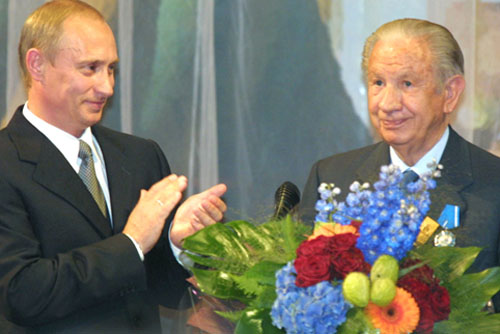
Moscow, 2001, Bolshoi Theater: Vladimir Putin honors Juan Antonio Samaranch, his spy comrade? (Photo: President of Russia)
Vladimir Putin, the new Russian President, and the old apparatchik Vitaly Smirnow, have been the hosts of the IOC session in July 2001. The Bolshoi Theater, already under construction, was kept open for a special performance of IOC president Samaranch’s favorite ballet, „Giselle“, Putin and Samaranch sat on chairs better described as thrones in the first row. I remember having an interesting discussion with Jean-Marie Weber, ISL’s bribes messenger and Dassler’s bookkeeper in front of the Bolshoi. Samaranch, a member of the Opus Dei, got what he wanted at the Moscow elections: Jacques Rogge from Belgium became the 8th IOC President, the Olympic Games 2008 were awarded to Beijing.
And then came Guatemala, the IOC session 2007. According to the Evaluation report of the IOC Sochi was the worst candidate for the Winter Olympics 2014. But Sochi won against Salzburg and PyeongChang. It was Vitaly Smirnov who persuades Samaranch on behalf of Putin to fly to Guatemala and to lobby for Sochi. Samaranch was flown in a government airplane. IOC members would tell me: this was the decision. This was the victory for Sochi. All people talked about the power and influence of the KGB/FSB, about Putin’s speech in front of the IOC session and about the money of Russian oligarchs.
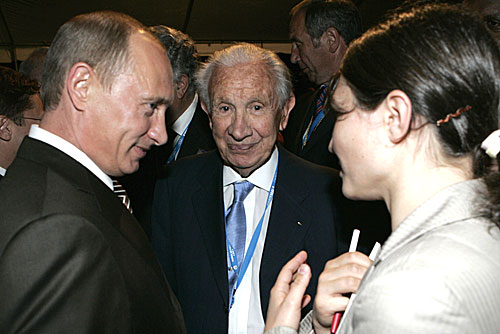
Guatemala, 2007, IOC Session: Vladimir Putin, Juan Antonio Samaranch, then IOC Honorary President (Photo: President of Russia)
IOC members would tell us in 2007 under tears that they could not refuse to vote for Sochi. Because they owed Samaranch more than a favor.
And then came Zurich, FIFA’s infamous World Cup decision in December 2010, now a subject of criminal investigations in several countries. Historian Yuri Felshtinsky, a pal of Russian spy Alexander Litvinenko, who was murdered using radioactive polonium in London in 2006, commented soon after FIFA’s decision:
Russia in general, and Vladimir Putin in particular, has a long history of using improper influence to gain prestigious sports events. Under the Soviet Union it was chess, now it’s the Olympics and football. The 2014 Winter Olympics in Sochi were handed to Russia by one of the highest-ranking members of the IOC, who was blackmailed by the KGB. The Russian secret service has unbeatable experience in ruthlessly exploiting the weaknesses of sports bosses. But we will probably never find out how they did it. These guys are very good at covering their tracks.
There is much more to say, there are many pieces of the olympic jigsaw. There are many of the 35 olympic IFs under control by Russia, Mr Putin’s sport-political army including oligarchs such as Alisher Usmanov, Vladimir Lisin and others.
I wanted to mention just a few key events of the big olympic story and raise some questions.
Owen Gibson has written a brilliant analysis on Guardian’s website two days ago. He recalled the IOC presidential election in Buenos Aires, 2013:
As Thomas Bach exited the hall of the Buenos Aires Hilton after realising his long-held ambition and securing the presidency of the International Olympic Committee in 2013, a phone was thrust into his hand amid the scrum. On the other end of the line was Vladimir Putin, the first to offer his congratulations to the man who was now among the most powerful in sport.
Less than a year later, the German was shoulder to shoulder with Putin to hail the „excellent Games“ in Sochi, a $51bn show of excess and Russian success that as we now know was underpinned by an elaborate doping scam taking in steroid cocktails nicknamed Duchess, secret agents disguised as sewer workers, fake walls and a mouse hole through which dirty samples were swapped for clean ones.
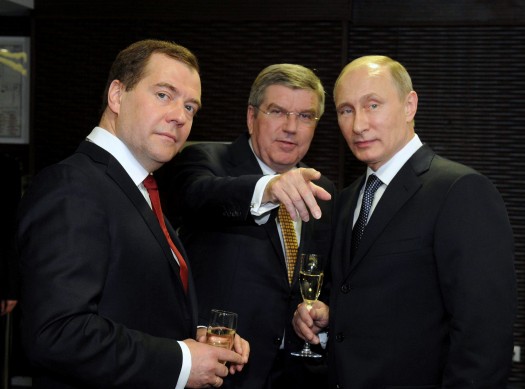
Sochi, 2014: Dmitry Medwedew, Thomas Bach, Vladimir Putin (Photo: President of Russia)
One should not forget that the man who revealed the real costs of the Sochi Olympics, the corruption and the $51bn price tag, was killed in February 2015 in Moscow: The politician, opposition leader and Sochi born Boris Nemtzov.
One should not forget that former Russian anti-doping chief Nikita Kamayev, who has planned to publish a book, died on 14 February 2016 of „a massive heart attack“.
Said Russia’s sport minister Vitaly Mutko:
It’s a very unexpected death. The man seemed healthy and everything was fine.
A few days before, another former RUSADA official, Vyacheslav Sinev, shared the fate of Mr Kamayev. Another „very unexpected death“.
Coincidences wherever you look.
Nevertheless, in July 2016, we do know a little bit more about the Olympics, Mr Putin, three IOC Presidents, a state orchestrated doping system and the role of the KGB/FSB.
There are still major secrets. (This time I did not even mention the strong connections between leading sport officials and KGB spies to the Russian mafia and other families of organized crime. Olympic sports, especially combat sports, have always been a talent pool for mobsters.)
There’s incredible pressure and threat.
But there is, at least, some hope.
Consider to support investigative journalism, freelance journalism, when booking the Rio 2016 coverage ticket or an Annual ticket for my blog „Sport and Politics“.
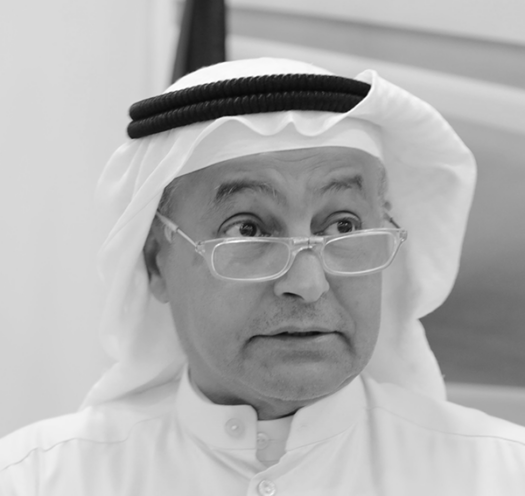


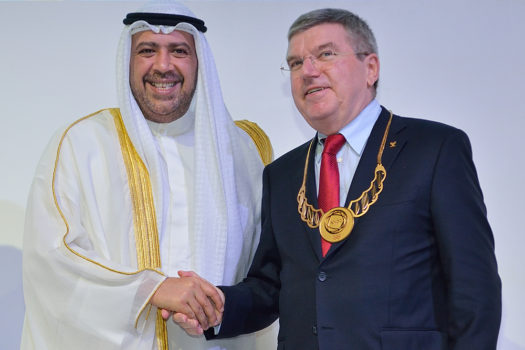
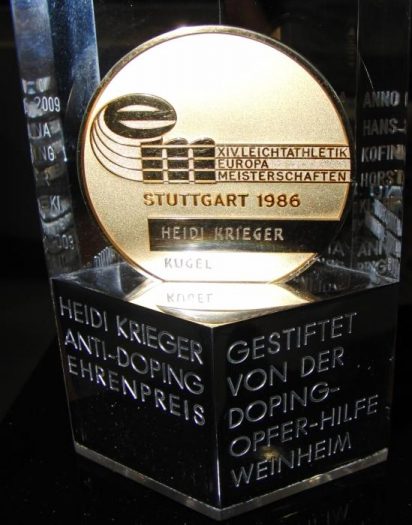
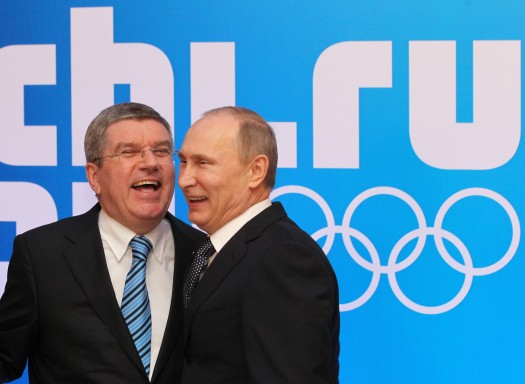
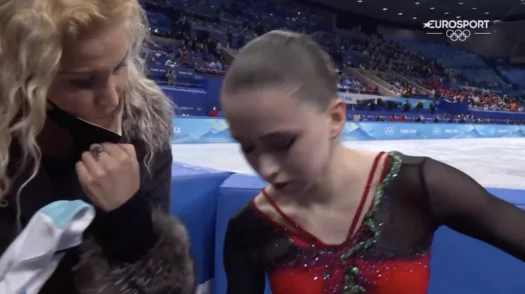
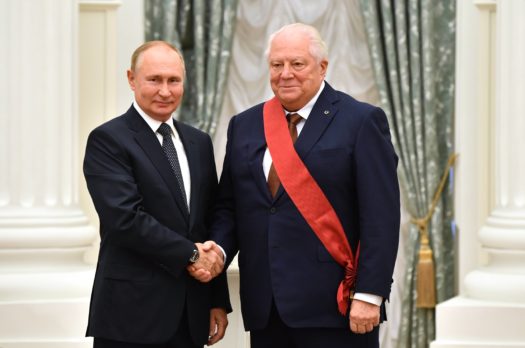
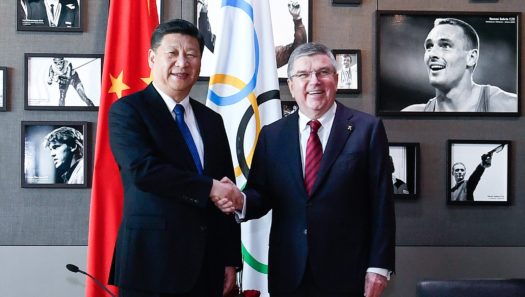
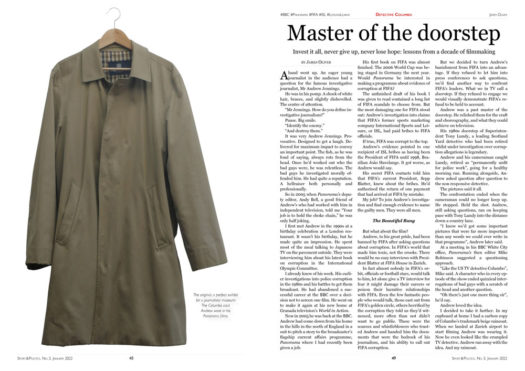
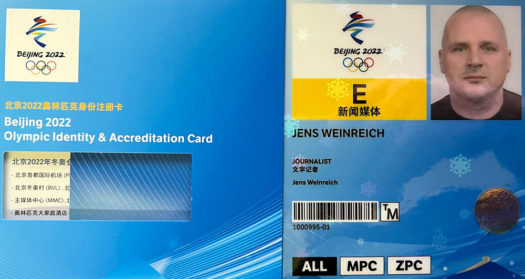
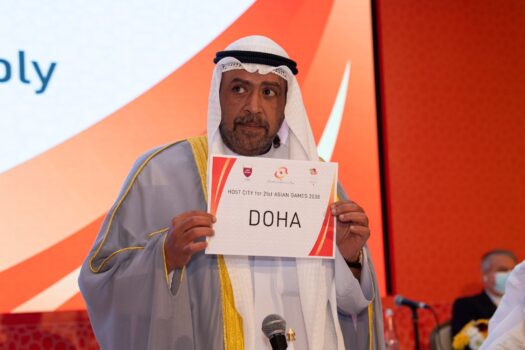
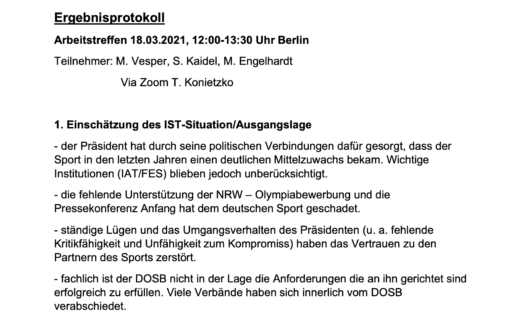
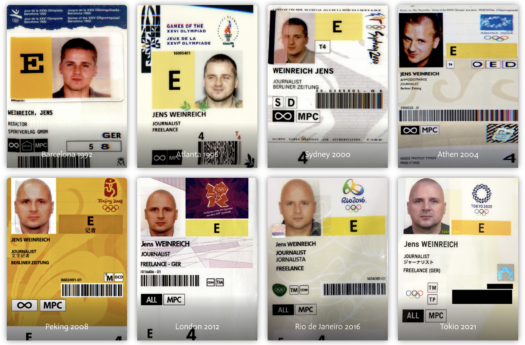
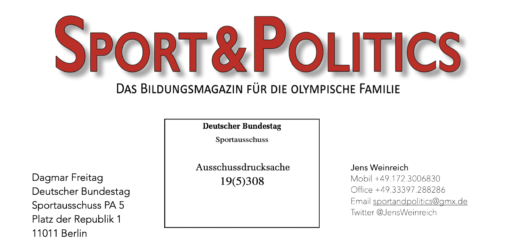
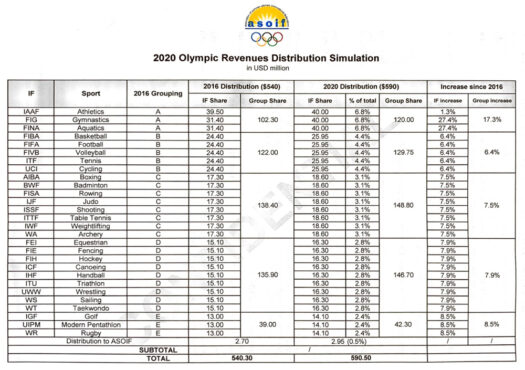
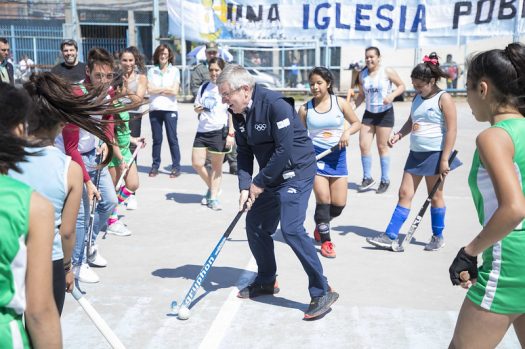
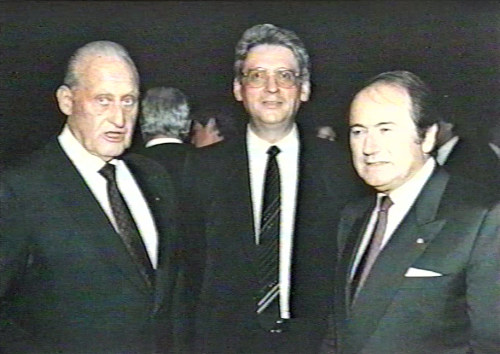
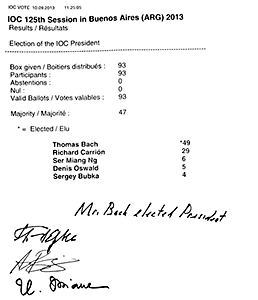
Pingback: Privátban oroszokkal bizniszel a Nemzetközi Olimpiai Bizottság elnöke | Online Újság
Pingback: Privátban oroszokkal bizniszel a Nemzetközi Olimpiai Bizottság elnöke - Hírek börzéje minden nap!
Thomas Kistner und Johannes Knuth in der SZ: Issinbajewa droht der Sportwelt
Pingback: live aus Rio (7): Eröffnungsfeier im Mario-Götze-Mausoleum • Sport and Politics
Pingback: Thomas Bach: die vielfältigen Lebenssachverhalte des unpolitischsten deutschen IOC-Präsidenten • Sport and Politics
Pingback: live-Blog: IOC lässt Russlands Staatsdoping-NOK zu, sperrt aber Whistleblowerin Stepanowa • Sport and Politics
Pingback: live aus PyeongChang (6): Der Fall Pound – wer kritisiert wird attackiert • SPORT & POLITICS
Pingback: Tokio 2o20: Schmiergeld für IOC-Stimmen – SPORT & POLITICS